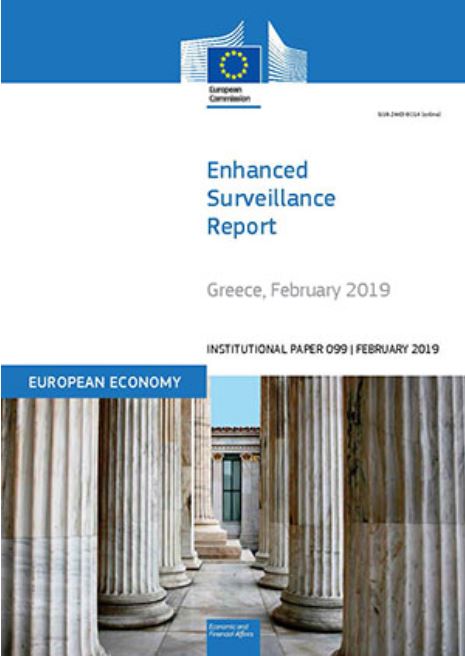European Commission - Enhanced Surveillance Report – Greece, February 2019
Second enhanced surveillance report
On 27 February 2019, the Commission adopted the second enhanced surveillance report for Greece alongside the winter package under the European Semester. The report assesses Greece’s progress with respect to policy commitments made at the Eurogroup in June 2018. The publication of the report follows a mission to Greece which took place from 21 to 25 January 2019, in which staff from the European Central Bank, the European Stability Mechanism and the International Monetary Fund participated.
Enhanced Surveillance Report – Greece, February 2019

First enhanced surveillance report
On 21 November 2018, the Commission adopted the first enhanced surveillance report for Greece alongside the autumn package under the European Semester. The report covers latest economic and financial developments in Greece as well as an assessment of implementation of reform commitments given by Greece to the European partners at the June 2018 Eurogroup. The publication of the report follows the first post-programme mission to Greece which took place from 10 to 14 September 2018, in which staff from the European Central Bank, the European Stability Mechanism and the International Monetary Fund participated.
Enhanced Surveillance Report – Greece, November 2018
Activation of enhanced surveillance
On 11 July 2018, the Commission adopted a decision to activate the enhanced surveillance framework for Greece. This decision enters into force after the successful conclusion of the ESM stability support programme on 21 August 2018.
As part of the comprehensive agreement reached in the Eurogroup statement of 22 June 2018, the Greek authorities made commitments, as set out in the annex to the Eurogroup statement to continue the implementation of all key reforms adopted under the ESM programme and sustain their objectives, as well as complete certain key structural reforms initiated under the ESM programme against agreed deadlines.
In parallel, Greece will be fully integrated into the European Semester framework of economic and social policy coordination as from 21 August 2018. Synergies between the enhanced surveillance and European Semester processes will be maximised so as to ensure coherence and avoid undue burdens on the administration. This marks a clear shift towards a new chapter for Greece after years of financial assistance programmes.
Enhanced surveillance is a post-programme framework adapted to Greece in view of the longstanding crisis and challenges faced. It will support the continuation, completion, and delivery of reforms agreed under the programme, in line with the commitments made by the Greek authorities through a close monitoring of the economic, fiscal and financial situation and its evolution. Monitoring will be undertaken by the Commission, in liaison with the ECB, and where appropriate, with the IMF. The ESM will also participate in the context of its Early Warning System as in all other instances of post-programme surveillance.
Enhanced surveillance provides for quarterly reports, which will be the basis for the activation of policy-contingent debt measures agreed in the Eurogroup statement of June 22.
Contacts


